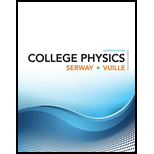
Concept explainers
Hydrothermal vents deep on the ocean floor spout water at temperatures as high as 570°C. This temperature is below the boiling point of water because of the immense pressure at that depth. Because the surrounding ocean temperature is at 4.0°C, an organism could use the temperature gradient as a source of energy. (a) Assuming the specific heat of water under these conditions is 1.0 cal/g · °C, how much energy is released when 1.0 L of water is cooled from 570°C to 4.0°C? (b) What is the maximum usable energy an organism can extract from this energy source? (Assume the organism has some internal type of
Want to see the full answer?
Check out a sample textbook solution
Chapter 12 Solutions
College Physics
- Consider the latent heat of fusion and the latent heat of vaporization for H2O, 3.33 105 J/kg and 2.256 106 J/kg, respectively. How much heat is needed to a. melt 2.00 kg of ice and b. vaporize 2.00 kg of water? Assume the temperatures of the ice and steam are at the melting point and vaporization point, respectively. (a). UsingEq21.9, Q = mLF = (2.00 kg) (3.33l05 J/kg) = 6.66105 J (b).UsingEq21.10. Q = mLV = (2.00kg) (2.256106 J/kg) = 14.51106 Jarrow_forwardAn ideal gas initially at 300 K undergoes an isobaric expansion at 2.50 kPa. If the volume increases from 1.00 m3 to 3.00 m3 and 12.5 kJ is transferred to the gas by heat, what are (a) the change in its internal energy and (b) its final temperature?arrow_forwardAt high noon, the Sun delivers 1 000 W to each square meter of a blacktop road. If the hot asphalt transfers energy only by radiation, what is its steady-state temperature?arrow_forward
- On his honeymoon, James Joule traveled from England to Switzerland. He attempted to verify his idea of the inter-convertibility of mechanical energy and internal energy by measuring the increase in temperature of water that fell in a waterfall. For the waterfall near Chamonix in the French Alps, which has a 120-m drop, what maximum temperature rise could Joule expect? He did not succeed in measuring it, partly because evaporation cooled the falling water and also because his thermometer was not sufficiently sensitive.arrow_forwardWhy is a person able to remove a piece of dry aluminum foil from a hot oven with bare fingers, whereas a burn results if there is moisture on the foil?arrow_forwardIn 1993, the U.S. government instituted a requirement that all room air conditioners sold in the United States must have an energy efficiency ratio (EER) of 10 or higher. The EER is defined as the ratio of the cooling capacity of the air conditioner, measured in British thermal units per hour, or Btu/h, to its electrical power requirement in watts. (a) Convert the EER of 10.0 to dimensionless form, using the conversion 1 Btu = 1 055 J. (b) What is the appropriate name for this dimensionless quantity? (c) In the 1970s, it was common to find room air conditioners with EERs of 5 or lower. State how the operating costs compare for 10 000-Btu/h air conditioners with EERs of 5.00 and 10.0. Assume each air conditioner operates for 1 500 h during the summer in a city where electricity costs 17.0 per kWh.arrow_forward
 Principles of Physics: A Calculus-Based TextPhysicsISBN:9781133104261Author:Raymond A. Serway, John W. JewettPublisher:Cengage Learning
Principles of Physics: A Calculus-Based TextPhysicsISBN:9781133104261Author:Raymond A. Serway, John W. JewettPublisher:Cengage Learning Physics for Scientists and Engineers, Technology ...PhysicsISBN:9781305116399Author:Raymond A. Serway, John W. JewettPublisher:Cengage Learning
Physics for Scientists and Engineers, Technology ...PhysicsISBN:9781305116399Author:Raymond A. Serway, John W. JewettPublisher:Cengage Learning College PhysicsPhysicsISBN:9781285737027Author:Raymond A. Serway, Chris VuillePublisher:Cengage Learning
College PhysicsPhysicsISBN:9781285737027Author:Raymond A. Serway, Chris VuillePublisher:Cengage Learning Physics for Scientists and Engineers: Foundations...PhysicsISBN:9781133939146Author:Katz, Debora M.Publisher:Cengage Learning
Physics for Scientists and Engineers: Foundations...PhysicsISBN:9781133939146Author:Katz, Debora M.Publisher:Cengage Learning Physics for Scientists and EngineersPhysicsISBN:9781337553278Author:Raymond A. Serway, John W. JewettPublisher:Cengage Learning
Physics for Scientists and EngineersPhysicsISBN:9781337553278Author:Raymond A. Serway, John W. JewettPublisher:Cengage Learning Physics for Scientists and Engineers with Modern ...PhysicsISBN:9781337553292Author:Raymond A. Serway, John W. JewettPublisher:Cengage Learning
Physics for Scientists and Engineers with Modern ...PhysicsISBN:9781337553292Author:Raymond A. Serway, John W. JewettPublisher:Cengage Learning





